化工专业英语论文
- 格式:doc
- 大小:32.00 KB
- 文档页数:2
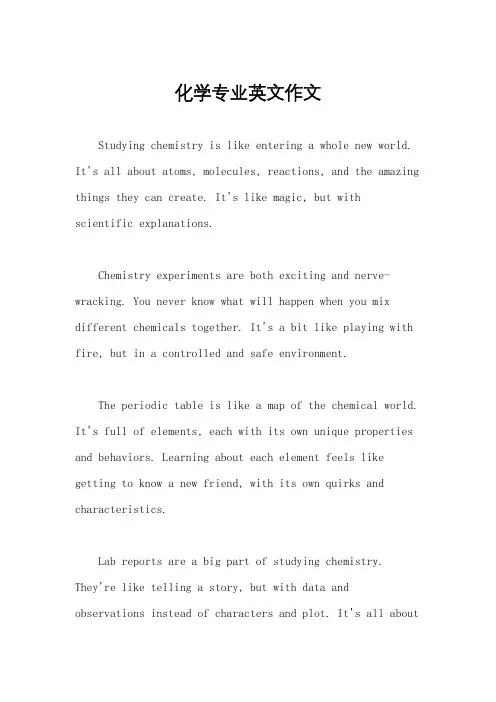
化学专业英文作文Studying chemistry is like entering a whole new world. It's all about atoms, molecules, reactions, and the amazing things they can create. It's like magic, but withscientific explanations.Chemistry experiments are both exciting and nerve-wracking. You never know what will happen when you mix different chemicals together. It's a bit like playing with fire, but in a controlled and safe environment.The periodic table is like a map of the chemical world. It's full of elements, each with its own unique properties and behaviors. Learning about each element feels like getting to know a new friend, with its own quirks and characteristics.Lab reports are a big part of studying chemistry.They're like telling a story, but with data and observations instead of characters and plot. It's all aboutdocumenting what happened in an experiment and what it means in the bigger picture of chemistry.Chemistry equations can be intimidating at first, but once you understand the rules, they start to make sense.It's like solving a puzzle, trying to balance the elements on both sides of the equation to make everything work out perfectly.Organic chemistry is like learning a new language. It's full of complex structures and reactions, and it takes time and practice to become fluent in it. But once you do, it opens up a whole new world of possibilities in the field of chemistry.In the end, studying chemistry is all about curiosity and discovery. It's about asking questions, conducting experiments, and uncovering the secrets of the chemical world. It's a journey of constant learning and exploration, and it never fails to amaze and inspire.。
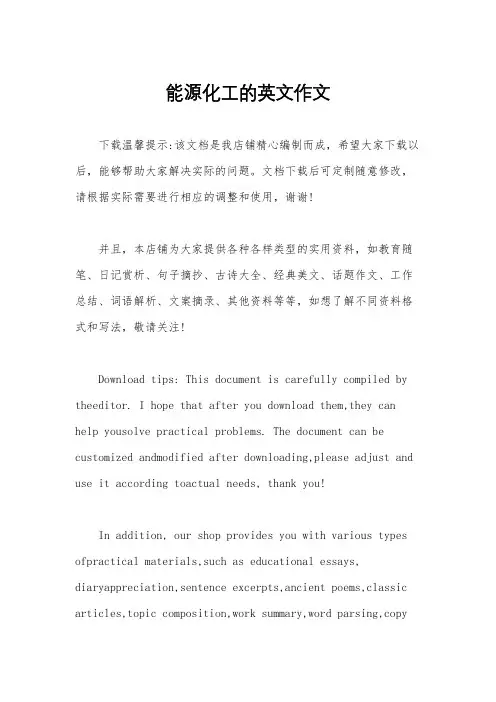
能源化工的英文作文下载温馨提示:该文档是我店铺精心编制而成,希望大家下载以后,能够帮助大家解决实际的问题。
文档下载后可定制随意修改,请根据实际需要进行相应的调整和使用,谢谢!并且,本店铺为大家提供各种各样类型的实用资料,如教育随笔、日记赏析、句子摘抄、古诗大全、经典美文、话题作文、工作总结、词语解析、文案摘录、其他资料等等,如想了解不同资料格式和写法,敬请关注!Download tips: This document is carefully compiled by theeditor. I hope that after you download them,they can help yousolve practical problems. The document can be customized andmodified after downloading,please adjust and use it according toactual needs, thank you!In addition, our shop provides you with various types ofpractical materials,such as educational essays, diaryappreciation,sentence excerpts,ancient poems,classic articles,topic composition,work summary,word parsing,copyexcerpts,other materials and so on,want to know different data formats andwriting methods,please pay attention!Energy and chemicals are really important in our lives. You know, we use energy every day, like when we turn on the lights or drive our cars. And chemicals are in so many things we use, from the soap we wash with to the materials our clothes are made of.In the energy sector, there are all kinds of sources. Fossil fuels are common, but there are also renewable ones like solar and wind. They each have their pros and cons.Chemical processes are fascinating. How they can take simple substances and turn them into complex products that we need. It's like magic.And don't forget about the impact on the environment. We need to find ways to make energy and chemicals in a more sustainable way to protect our planet.。

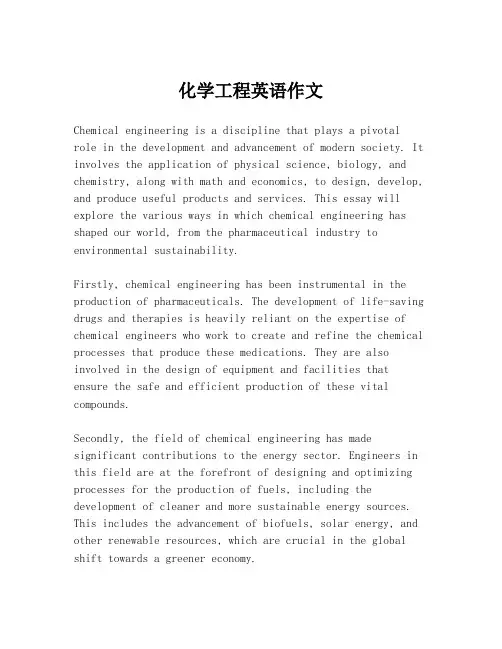
化学工程英语作文Chemical engineering is a discipline that plays a pivotalrole in the development and advancement of modern society. It involves the application of physical science, biology, and chemistry, along with math and economics, to design, develop, and produce useful products and services. This essay will explore the various ways in which chemical engineering has shaped our world, from the pharmaceutical industry to environmental sustainability.Firstly, chemical engineering has been instrumental in the production of pharmaceuticals. The development of life-saving drugs and therapies is heavily reliant on the expertise of chemical engineers who work to create and refine the chemical processes that produce these medications. They are also involved in the design of equipment and facilities that ensure the safe and efficient production of these vital compounds.Secondly, the field of chemical engineering has made significant contributions to the energy sector. Engineers in this field are at the forefront of designing and optimizing processes for the production of fuels, including the development of cleaner and more sustainable energy sources. This includes the advancement of biofuels, solar energy, and other renewable resources, which are crucial in the global shift towards a greener economy.Moreover, chemical engineering is essential in the food and beverage industry. It is responsible for the development of processes that ensure the quality, safety, and longevity of food products. This includes the preservation techniques, packaging innovations, and the development of additives that enhance flavor and shelf life without compromising health.In addition to these areas, chemical engineering is also critical for environmental sustainability. Engineers work on solutions to reduce pollution, manage waste, and develop processes that minimize the environmental impact of industrial operations. This includes the treatment of wastewater, the development of more efficient chemical processes, and the creation of materials that are biodegradable or recyclable.Furthermore, the role of chemical engineering extends to materials science, where it is used to create new materials with specific properties for various applications. This includes the development of polymers for use in medical devices, the creation of stronger and lighter materials for aerospace engineering, and the synthesis of advanced materials for electronics.In conclusion, chemical engineering is a multifaceted discipline that has far-reaching implications for the betterment of society. From healthcare to energy, from food production to environmental protection, the contributions of chemical engineers are integral to the progress and well-being of our modern world. As we continue to face newchallenges, the innovative solutions that chemical engineering can provide will be more important than ever.。
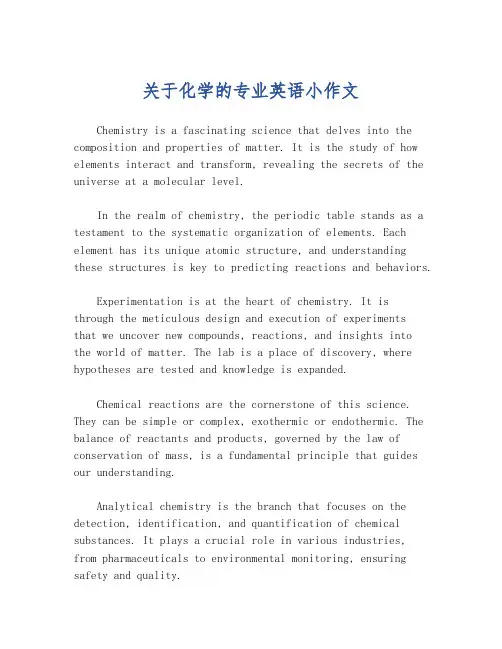
关于化学的专业英语小作文Chemistry is a fascinating science that delves into the composition and properties of matter. It is the study of how elements interact and transform, revealing the secrets of the universe at a molecular level.In the realm of chemistry, the periodic table stands as a testament to the systematic organization of elements. Each element has its unique atomic structure, and understanding these structures is key to predicting reactions and behaviors.Experimentation is at the heart of chemistry. It is through the meticulous design and execution of experimentsthat we uncover new compounds, reactions, and insights intothe world of matter. The lab is a place of discovery, where hypotheses are tested and knowledge is expanded.Chemical reactions are the cornerstone of this science. They can be simple or complex, exothermic or endothermic. The balance of reactants and products, governed by the law of conservation of mass, is a fundamental principle that guides our understanding.Analytical chemistry is the branch that focuses on the detection, identification, and quantification of chemical substances. It plays a crucial role in various industries,from pharmaceuticals to environmental monitoring, ensuring safety and quality.Organic chemistry, a sub-discipline, deals with carbon-containing compounds. The complexity of organic molecules and their vast array of reactions make it a rich field for innovation and the development of new materials and drugs.Biochemistry, another branch, explores the chemical processes within living organisms. It is the intersection of biology and chemistry, where the understanding of enzymes, proteins, and metabolic pathways is crucial for advancements in medicine and nutrition.Chemistry education is vital for nurturing the next generation of scientists. It equips students with the analytical skills and knowledge base necessary to contribute to scientific research and technological innovation.In conclusion, chemistry is an ever-evolving field with applications that touch every aspect of our lives. From the medicines we take to the materials we use, the study of chemistry is integral to the progress of human civilization.。
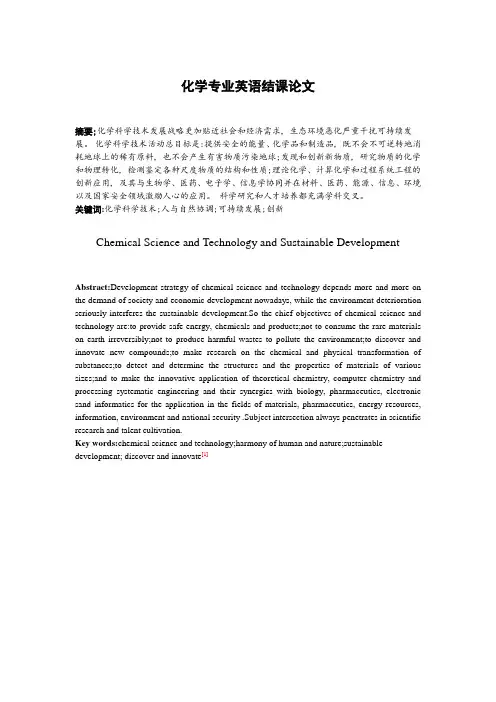
化学专业英语结课论文摘要;化学科学技术发展战略更加贴近社会和经济需求, 生态环境恶化严重干扰可持续发展。
化学科学技术活动总目标是:提供安全的能量、化学品和制造品, 既不会不可逆转地消耗地球上的稀有原料, 也不会产生有害物质污染地球;发现和创新新物质, 研究物质的化学和物理转化, 检测鉴定各种尺度物质的结构和性质;理论化学、计算化学和过程系统工程的创新应用, 及其与生物学、医药、电子学、信息学协同并在材料、医药、能源、信息、环境以及国家安全领域激励人心的应用。
科学研究和人才培养都充满学科交叉。
关键词:化学科学技术;人与自然协调;可持续发展;创新Chemical Science and Technology and Sustainable DevelopmentAbstract:Development strategy of chemical science and technology depends more and more on the demand of society and economic development nowadays, while the environment deterioration seriously interferes the sustainable development.So the chief objectives of chemical science and technology are:to provide safe energy, chemicals and products;not to consume the rare materials on earth irreversibly;not to produce harmful wastes to pollute the environment;to discover and innovate new compounds;to make research on the chemical and physical transformation of substances;to detect and determine the structures and the properties of materials of various sizes;and to make the innovative application of theoretical chemistry, computer chemistry and processing systematic engineering and their synergies with biology, pharmaceutics, electronic sand informatics for the application in the fields of materials, pharmaceutics, energy resources, information, environment and national security .Subject intersection always penetrates in scientific research and talent cultivation.Key words:chemical science and technology;harmony of human and nature;sustainable development; discover and innovate[1]1 “教”之道1.1 与时俱进,科学合理安排教学内容材料化学的知识面很广,相应的《材料化学专业英语》既要综合非金属材料又要涵盖高分子材料,既要涉及单一材料,又要涉及复合材料,既要涉及结构材料又要涉及功能材料,此外还要与大学基础英语相衔接又要为学生以后毕业论文中摘要的书写及以后研究生深造的英语打好基础,覆盖面广,且各方面的知识更新的很快!所以在教学内容安排上,必须科学合理,与时俱进![2]1.2 走人与自然协调的可持续发展之路通过几年的教学改革,学生对以专业阅读为基础,强调培养专业英语的实际应用能力和学术交流能力的化学专业英语课程的教学内容、培养方式普遍认可。
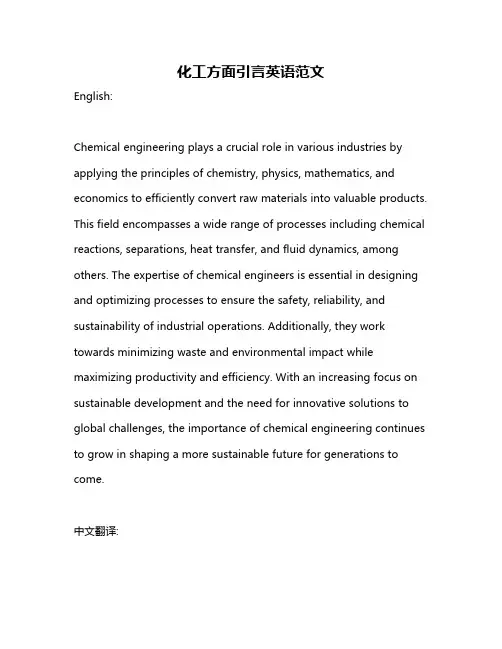
化工方面引言英语范文English:Chemical engineering plays a crucial role in various industries by applying the principles of chemistry, physics, mathematics, and economics to efficiently convert raw materials into valuable products. This field encompasses a wide range of processes including chemical reactions, separations, heat transfer, and fluid dynamics, among others. The expertise of chemical engineers is essential in designing and optimizing processes to ensure the safety, reliability, and sustainability of industrial operations. Additionally, they work towards minimizing waste and environmental impact while maximizing productivity and efficiency. With an increasing focus on sustainable development and the need for innovative solutions to global challenges, the importance of chemical engineering continues to grow in shaping a more sustainable future for generations to come.中文翻译:化学工程通过应用化学、物理、数学和经济学的原理,将原材料高效地转化为有价值的产品,在各个行业中发挥着至关重要的作用。
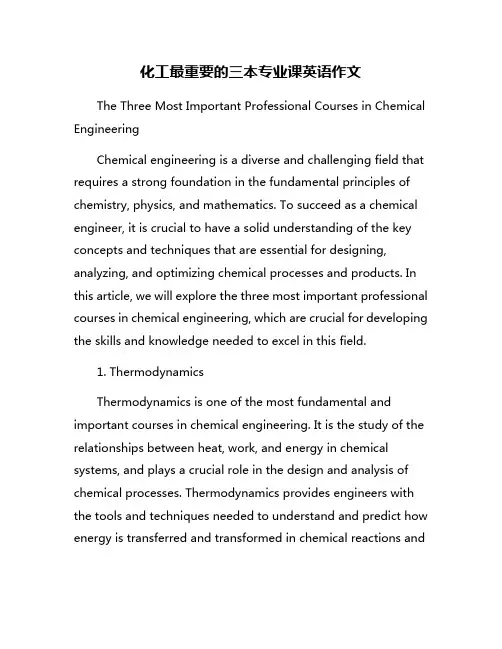
化工最重要的三本专业课英语作文The Three Most Important Professional Courses in Chemical EngineeringChemical engineering is a diverse and challenging field that requires a strong foundation in the fundamental principles of chemistry, physics, and mathematics. To succeed as a chemical engineer, it is crucial to have a solid understanding of the key concepts and techniques that are essential for designing, analyzing, and optimizing chemical processes and products. In this article, we will explore the three most important professional courses in chemical engineering, which are crucial for developing the skills and knowledge needed to excel in this field.1. ThermodynamicsThermodynamics is one of the most fundamental and important courses in chemical engineering. It is the study of the relationships between heat, work, and energy in chemical systems, and plays a crucial role in the design and analysis of chemical processes. Thermodynamics provides engineers with the tools and techniques needed to understand and predict how energy is transferred and transformed in chemical reactions andprocesses, and how these processes can be optimized for efficiency and sustainability.In a thermodynamics course, students learn about the laws of thermodynamics, heat transfer, phase equilibria, and reaction kinetics. They also develop skills in using thermodynamic models and software to analyze and design chemical processes. Thermodynamics is essential for a wide range of applications in chemical engineering, including the design of heat exchangers, reactors, and distillation columns, as well as the optimization of energy efficiency and environmental sustainability in chemical processes.2. Fluid MechanicsFluid mechanics is another key course in chemical engineering that is essential for understanding the behavior of fluids in motion. It is the study of how fluids such as liquids and gases flow and interact with solid boundaries, and is crucial for the design and analysis of processes involving fluid flow, such as pumps, piping systems, and chemical reactors. Fluid mechanics provides engineers with the tools and techniques needed to predict and control the behavior of fluids in chemical processes, and to optimize them for efficiency and performance.In a fluid mechanics course, students learn about the fundamental principles of fluid flow, viscosity, turbulence, and pressure drop. They also develop skills in using fluid mechanics models and software to analyze and design fluid systems. Fluid mechanics is essential for a wide range of applications in chemical engineering, including the design of mixing and separation equipment, the analysis of reaction kinetics and mass transfer, and the optimization of flow rates and pressures in chemical processes.3. Reaction EngineeringReaction engineering is the third key course in chemical engineering, and is essential for understanding and optimizing chemical reactions in processes. It is the study of how chemical reactions occur, how they are affected by factors such as temperature, pressure, and concentration, and how they can be optimized for efficiency and selectivity. Reaction engineering provides engineers with the tools and techniques needed to design and analyze chemical reactions, and to optimize them for performance and sustainability.In a reaction engineering course, students learn about the kinetics of chemical reactions, chemical reactor design, and reactor performance analysis. They also develop skills in usingreaction engineering models and software to analyze and design chemical reactions. Reaction engineering is essential for a wide range of applications in chemical engineering, including the design of catalytic converters, polymerization reactors, and bioreactors, as well as the optimization of reaction conditions and selectivity in chemical processes.In conclusion, thermodynamics, fluid mechanics, and reaction engineering are the three most important professional courses in chemical engineering, and are essential for understanding and optimizing chemical processes and products. By mastering these courses, chemical engineers can develop the skills and knowledge needed to excel in this challenging and rewarding field, and to make a positive impact on society and the environment through their work.。
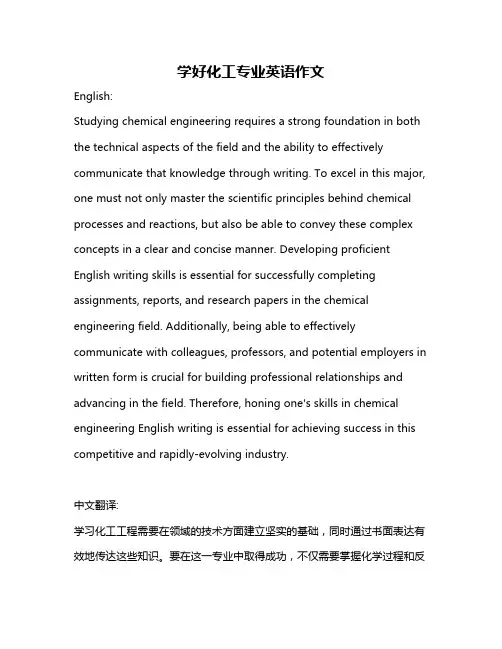
学好化工专业英语作文English:Studying chemical engineering requires a strong foundation in both the technical aspects of the field and the ability to effectively communicate that knowledge through writing. To excel in this major, one must not only master the scientific principles behind chemical processes and reactions, but also be able to convey these complex concepts in a clear and concise manner. Developing proficient English writing skills is essential for successfully completing assignments, reports, and research papers in the chemical engineering field. Additionally, being able to effectively communicate with colleagues, professors, and potential employers in written form is crucial for building professional relationships and advancing in the field. Therefore, honing one's skills in chemical engineering English writing is essential for achieving success in this competitive and rapidly-evolving industry.中文翻译:学习化工工程需要在领域的技术方面建立坚实的基础,同时通过书面表达有效地传达这些知识。
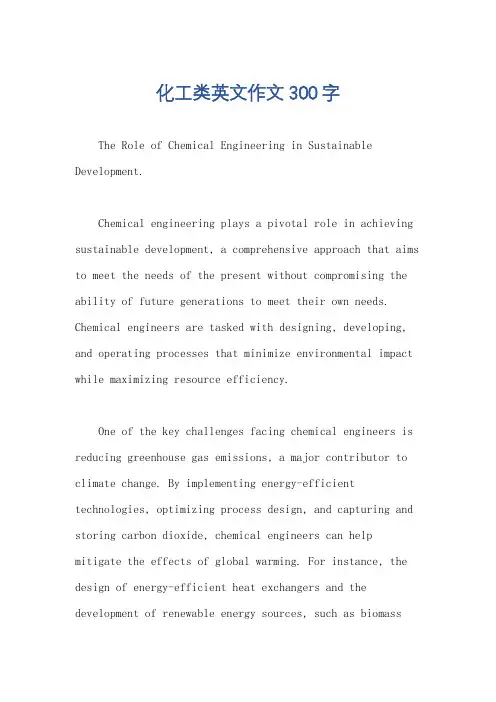
化工类英文作文300字The Role of Chemical Engineering in Sustainable Development.Chemical engineering plays a pivotal role in achieving sustainable development, a comprehensive approach that aims to meet the needs of the present without compromising the ability of future generations to meet their own needs. Chemical engineers are tasked with designing, developing, and operating processes that minimize environmental impact while maximizing resource efficiency.One of the key challenges facing chemical engineers is reducing greenhouse gas emissions, a major contributor to climate change. By implementing energy-efficient technologies, optimizing process design, and capturing and storing carbon dioxide, chemical engineers can helpmitigate the effects of global warming. For instance, the design of energy-efficient heat exchangers and the development of renewable energy sources, such as biomassand solar power, can significantly reduce the carbon footprint of chemical processes.Chemical engineers also play a crucial role in developing sustainable materials and products. By using renewable resources, bio-based materials, and biodegradable plastics, chemical engineers can reduce the reliance on fossil fuels and minimize plastic waste. For example, the production of bioplastics from plant-based materials not only reduces the use of petroleum-based plastics but also offers biodegradable alternatives that decompose naturally.Furthermore, chemical engineers are responsible for managing and treating wastewater and hazardous waste to prevent pollution and protect the environment. By developing advanced filtration, purification, and detoxification technologies, chemical engineers can ensure that wastewater is safely discharged and that hazardous waste is properly disposed of. For instance, the use of reverse osmosis membranes for water purification and the development of catalytic converters for reducing air pollution are examples of how chemical engineeringcontributes to environmental protection.Moreover, chemical engineers are involved in developing sustainable energy technologies, such as fuel cells, solar energy, and batteries. By optimizing the performance and efficiency of these technologies, chemical engineers can contribute to the transition to a low-carbon economy. For example, the development of high-power density batteriesfor electric vehicles and the design of efficient fuelcells for power generation are key examples of the role of chemical engineering in sustainable energy.In conclusion, chemical engineering is an essential field in achieving sustainable development. By optimizing processes, developing sustainable materials and products, managing waste, and contributing to sustainable energy technologies, chemical engineers play a vital role in reducing environmental impact, conserving resources, and creating a more sustainable future for generations to come.。
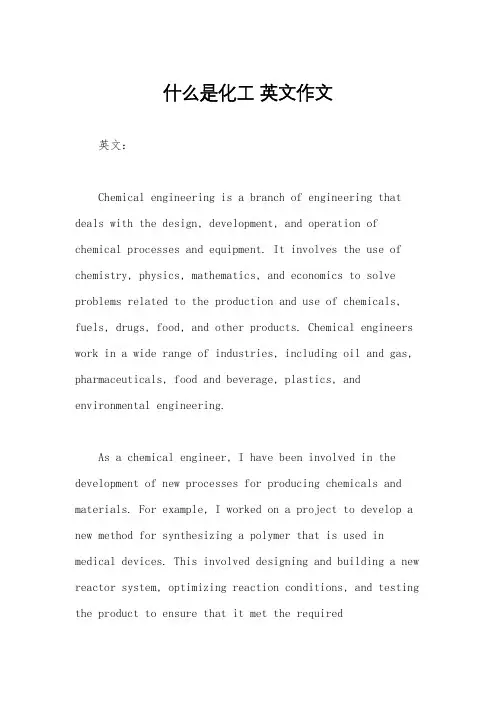
什么是化工英文作文英文:Chemical engineering is a branch of engineering that deals with the design, development, and operation of chemical processes and equipment. It involves the use of chemistry, physics, mathematics, and economics to solve problems related to the production and use of chemicals, fuels, drugs, food, and other products. Chemical engineers work in a wide range of industries, including oil and gas, pharmaceuticals, food and beverage, plastics, and environmental engineering.As a chemical engineer, I have been involved in the development of new processes for producing chemicals and materials. For example, I worked on a project to develop a new method for synthesizing a polymer that is used in medical devices. This involved designing and building a new reactor system, optimizing reaction conditions, and testing the product to ensure that it met the requiredspecifications.Another aspect of chemical engineering is process optimization. This involves analyzing existing processes to identify inefficiencies and areas for improvement. For example, I worked on a project to optimize a production process for a specialty chemical. We were able to reducethe cycle time, increase yield, and improve product quality, which resulted in significant cost savings for the company.中文:化学工程是一种工程学科,涉及化学过程和设备的设计、开发和操作。
化工简介英文作文模板下载温馨提示:该文档是我店铺精心编制而成,希望大家下载以后,能够帮助大家解决实际的问题。
文档下载后可定制随意修改,请根据实际需要进行相应的调整和使用,谢谢!并且,本店铺为大家提供各种各样类型的实用资料,如教育随笔、日记赏析、句子摘抄、古诗大全、经典美文、话题作文、工作总结、词语解析、文案摘录、其他资料等等,如想了解不同资料格式和写法,敬请关注!Download tips: This document is carefully compiled by theeditor. I hope that after you download them,they can help yousolve practical problems. The document can be customized andmodified after downloading,please adjust and use it according toactual needs, thank you!In addition, our shop provides you with various types ofpractical materials,such as educational essays, diaryappreciation,sentence excerpts,ancient poems,classic articles,topic composition,work summary,word parsing,copyexcerpts,other materials and so on,want to know different data formats andwriting methods,please pay attention!Chemical industry is really important. It makes all kinds of stuff we use every day. From the plastics in our phones to the fertilizers for our crops. It's a huge field that affects our lives in many ways.The chemical industry is super diverse. There are so many different chemicals and processes. Some are used to make medicines that keep us healthy. Others are for making materials that are strong and durable.It's not all roses though. There can be some risks. Chemicals can be dangerous if not handled properly. But there are strict rules and safety measures in place to make sure things are okay.Lots of people work in the chemical industry. They're the ones making all these great products happen. They need to be really smart and careful. It's a challenging but also really interesting job.。
如何学好化工专业的英语作文200字全文共6篇示例,供读者参考篇1How to Learn Chemical Engineering English Really Duper GoodHi friends! Today I'm gonna tell you all about how to get really really good at English for chemical engineering. It's super important 'cause all the books and stuff are in English. If you can't understand the English, how are you gonna learn about all the awesome chemical reactions and machinery?!First up, you gotta start early. Don't wait until college to try and learn it. That'll be way too late! The best time to start is when you're just a little kid in elementary school. Your brain is like a little sponge that can soak up all the English easily. The younger you start, the better you'll be!Next, you gotta practice every single day. That means reading, writing, listening, and speaking English constantly. Read ALL the books, magazines, websites, anything you can get your hands on that's in English and about science and engineering.Write stories, journals, emails, anything! The more you write and read, the better you'll get.For listening and speaking, watch movies, shows, YouTube videos, all in English with no subtitles or dubbing. It'll train your ears to understand English. Then practice speaking out loud as much as you can. Read books out loud, tell stories to your friends and family, sing songs in English! Don't be scared to make mistakes. That's how you learn.Another super important tip is to immerse yourself fully in English as much as possible. Put English subtitles on everything you watch. Change your phone and computer settings to English. Surround yourself with English books, music, movies, games, you name it! The more you're exposed to English, the faster it'll sink in.It also really helps to have an English buddy to practice with. Find a friend who is also learning and make a deal to only speak in English together. Or join an online group for language practice. Having a pal to chat with in English makes it way more fun!If you get stuck on words or grammar, don't be afraid to ask for help from teachers, parents, or even online dictionaries and learning websites. There are so many awesome resources these days to learn English. Use them all!The most important thing though, is to never ever give up! Learning a whole new language is super hard. There will be times when you feel frustrated and want to quit. Don't listen to that voice! Just keep swimming, as Dory from Finding Nemo would say. The more you practice, the easier it'll become.Imagine how amazing it'll be when you can read engineering textbooks, attend lectures, and chat with colleagues from around the world ALL in perfect English? It'll open up so many doors and opportunities for you. Chemical engineers who are fluent in English are super valuable.So there you have it friends - my best tips for becoming an English linguistics master for the chemical engineering field. Follow this advice and I pinky promise you'll be speaking, reading, and dreaming in English like a pro in no time! The science world will be your oyster. How cool is that?! Let's go grab those English skills by the horns and get cracking. Good luck!篇2How to Learn English Well for Chemical EngineeringHey there, friends! It's me, your pal Jamie. Today, I want to share some super tips on how to become a English pro if you're studying chemical engineering. It's really important to learnEnglish well, especially these big fancy words that grown-ups use. Why? Because chemical engineers work with people from all over the world, and English is like the common language that helps everyone understand each other. Pretty cool, right?First things first, you gotta start with the basics. That means learning the ABC's, how to read and write simple words and sentences. Practice makes perfect, so read lots of books, write in a journal, and don't be afraid to make mistakes. Your teachers and parents are there to help you get better.Once you've got the basics down, it's time to level up! Start learning more advanced vocabulary related to chemistry and engineering. Words like "reaction," "catalyst," "polymer," and "thermodynamics." I know, they sound like spells from a Harry Potter movie, but trust me, they're super important in the chemical engineering world.One fun way to learn new words is by playing word games like Scrabble or Boggle. You can also make flashcards with the words and their definitions, and quiz yourself or have your friends and family quiz you. Turn it into a game and see who can get the most words right!Another great tip is to read articles, books, or watch videos about chemical engineering topics. Even if you don't understandeverything at first, you'll start picking up on the language and getting familiar with how it's used. It's like learning a new superpower!Speaking of superpowers, listening is a crucial skill too. Pay attention in class when your teacher is explaining concepts, and don't be afraid to ask questions if you're confused. You can also find podcasts or lectures online to practice your listening comprehension.Now, let's talk about writing. Being able to clearly communicate your ideas in writing is super important for chemical engineers. Start by practicing writing lab reports or essays about chemical engineering topics. Have your teacher or parents review your work and provide feedback on your grammar, vocabulary, and clarity.And finally, don't forget about speaking practice! Join a study group or find a language partner to practice discussing chemical engineering concepts out loud. Roleplay situations like presenting research findings or explaining a process to a client. The more you practice, the more confident and fluent you'll become.Learning a new language can be challenging, but it's also a lot of fun! Imagine being able to travel the world andcommunicate with people from different cultures, all while working on cool chemical engineering projects. How awesome is that?So, there you have it, my friends – some super tips for becoming an English pro in the chemical engineering world. Remember, it takes time and effort, but with dedication and a positive attitude, you'll be speaking, reading, and writing like a pro in no time. Keep practicing, keep learning, and most importantly, have fun with it!篇3How to Learn English for Chemical Engineering (By a Little Kid)Hi there! My name is Timmy, and I'm in 5th grade. I love science, especially chemistry! I want to be a chemical engineer when I grow up. But learning all that science stuff in English is hard. My teacher says I need to work on my English if I want to be a great chemical engineer. So, I've been trying really hard to get better at English. Here are some tips that have helped me!First, you gotta read a lot of books and magazine articles about chemistry and chemical engineering. I know, I know, reading textbooks can be super boring. But if you pick fun topicsyou like, it won't be so bad. I really like reading about how they make different kinds of candy and sodas. That's chemical engineering! Every week, I check out books from the library about food science or cool experiments I can do at home. Reading helps me learn all the vocabulary words I need to know.Speaking of vocabulary, making flashcards is a must! Whenever I come across a new word like "catalyst" or "distillation", I write it down on an index card. Then I ask my parents or my teacher to explain what it means in simple terms I can understand. I keep all my flashcards in a big box and go through them every day. Repetition helps the words stick in my brain!Another thing that's really helped me is watching videos and documentaries about chemistry topics. Visuals make things so much easier to comprehend. My favorite shows are the ones that explain how everyday products are manufactured, like how plastic is made from oil or how aluminum cans are recycled. I get to see the chemical processes in action! Plus, the narrator uses all the proper scientific terms, so I'm hearing the English vocabulary over and over.Sometimes, when I'm having trouble understanding a difficult concept, I make up songs or raps about it. Gettingcreative and making it fun makes information way easier to remember. Last week, I wrote a whole rap about the steps of fractional distillation. My classmates thought it was hilarious, but hey, I aced that quiz!My parents have been super supportive through all of this too. We go on lots of field trips to science museums, factories, and even wastewater treatment plants. I get to see real chemical engineering in action and ask the workers tons of questions. My dad also found me a penpal who is a university student studying chemical engineering in the UK. We email back and forth in English, and she explains advanced topics in a simplified way I can understand.Learning all this chemistry stuff in English is definitely challenging, but being a great chemical engineer is my biggest dream. I'm going to keep working hard, using all my little tricks and techniques. Before you know it, I'll be that kid giving the chemistry lectures in perfect English! Who knows, maybe I'll even discover the next big scientific breakthrough. A guy can dream, right?Well, that's all the advice I've got for now. Keep practicing your English skills every single day, and you'll be a chemistry whiz kid like me in no time! Just don't blow anything up alongthe way. Speaking from experience here...whoops! Catch ya later, future chemical engineers!篇4How to Study Chemical Engineering WellHi friends! I'm going to tell you all about how to study chemical engineering cause that's what I want to be when I grow up! My dad is a chemical engineer and he's really smart and good at his job. I want to be just like him!First of all, you have to really like science and math. Chemical engineering has a ton of science like chemistry, physics, and biology. And there's also a whole lot of math with algebra, calculus, and statistics. If you don't like those subjects, then chemical engineering might not be for you. But if you do like them, then get ready cause there's more coming!In school, you have to work super hard in all your science and math classes. Pay really close attention, ask lots of questions, and never fall behind. My dad says the math and science classes for chemical engineers are really difficult. You can't just goof around! You have to study hard every single day. Do all your homework carefully and never copy anyone else's work. That's cheating and it won't help you learn.You also need to get good grades. My dad says you should try to get all A's if you can. The better your grades are, the easier it will be to get into a good university for chemical engineering later on. Universities have to make sure you're smart enough since it's such a tough major. With good grades, they'll know you can handle it.Outside of class, read up on chemistry, physics, and math topics that interest you. There are a lot of great books, websites, videos, and activities you can explore. Going to a science museum is also really fun and you can learn a ton. My favorite exhibits are always the chemistry ones with the cool reactions!In university, be prepared to work even harder than you did in school. My dad had to study late almost every night when he was a chemical engineering student. He took a bunch of super hard classes all at the same time on topics like thermodynamics, kinetics, fluid mechanics, heat and mass transfer, reactor design, and process control. It was intense! But he kept working really hard and never gave up.You'll probably also have to take classes on other important topics for engineers like computer programming, technical writing, economics, and statistics. Those are pretty difficult toofrom what my dad says. And you'll have lots of labs and group projects as well to practice real chemical engineering skills.Don't be discouraged though! As long as you have a passion for it and study as hard as you can, you can make it through. My dad did and look at him now - he's a great chemical engineer! Just take it one step at a time.After university, you'll finally be ready to start your career as a chemical engineer. There are all kinds of different jobs you could get working at plants, refineries, factories, laboratories, or offices. Some chemical engineers get to design and develop new processes, others get to optimize and improve processes, and others get to operate and maintain processes. No matter what type of job you get, you'll finally be putting all that hard studying into practice!I can't wait until I'm old enough to start studying chemical engineering seriously. It will be really tough but also really rewarding. If you love science, math, problem-solving, and being creative, then chemical engineering could be perfect for you too! Just remember to always work as hard as you can. With enough passion and perseverance, you can become a top chemical engineer! Maybe I'll even work alongside my dad or become an even better engineer than him someday. We'll have to see! Okay,time for me to get back to studying hard in school. Chemical engineering, here I come!篇5Hey there, kids! Are you interested in learning about the fascinating world of chemicals and how things work? If so, you might want to consider studying chemical engineering when you grow up. But wait, what's that? You're worried about learning all the big, complicated English words? Don't worry, I've got you covered!Learning English for chemical engineering might sound like a scary task, but it can actually be a lot of fun if you approach it the right way. Imagine being able to read all those cool science books and understand the secrets behind how things are made. Or picture yourself chatting with scientists from around the world, sharing your awesome ideas and discoveries. Isn't that exciting?Now, let me share some tips with you on how to make learning English for chemical engineering a breeze:Start early and read, read, read!You know how you love storytime? Well, try reading books and magazines about science and technology too. The more you read, the more new words you'll learn without even trying. It's like a fun game of word-catching!Watch educational videos and showsWho says learning has to be boring? There are so many amazing videos and TV shows that can teach you about chemistry, physics, and engineering in a super fun way. Grab some popcorn and let the learning begin!Play word gamesWord games are like brain candy – they're sweet and good for you! Try playing games like Scrabble, Boggle, or even make up your own word games. You'll be building your vocabulary without even realizing it.Keep a science journalWhenever you learn something new or have a brilliant idea, write it down in your very own science journal. Not only will it help you practice your writing skills, but you'll also have a record of your amazing discoveries!Find a study buddyLearning is always more fun with a friend. Find a classmate or a sibling who's also interested in science and engineering, and you can help each other out. You can quiz each other, discuss tough concepts, and maybe even invent something together!Don't be afraid to make mistakesRemember, everyone makes mistakes when they're learning something new. If you mispronounce a word or mix up some terms, don't worry! Just keep practicing, and soon those tricky words will become second nature.Stay curious and ask questionsThe best scientists and engineers never stop asking questions. If there's something you don't understand, don't be shy – raise your hand and ask your teacher or parents to explain it to you. Asking questions is the key to learning!Have fun with it!Learning should be an adventure, not a chore. Embrace the joy of discovery and let your imagination soar. Who knows, maybe one day you'll invent the next big thing that changes the world!So, there you have it, kids! Follow these tips, and soon you'll be speaking English like a chemical engineering pro. Remember,learning takes time and effort, but it's all worth it when you get to unlock the secrets of the universe. Keep exploring, keep learning, and most importantly, keep having fun!篇6How to Learn English for Chemical EngineeringHi there! My name is Tommy and I'm in 5th grade. My dream is to become a chemical engineer when I grow up. Chemical engineers are really cool - they get to design and operate plants that make all sorts of awesome things like fuels, plastics, foods, and medicines. But to be a good chemical engineer, you need to learn a lot of English since that's the main language used in science and engineering.Learning English for my future career is super important, but it can also be really hard and confusing sometimes. There are so many big words to memorize and weird grammar rules to follow. But I've been practicing a lot and my English keeps getting better and better each day. I want to share some tips that have helped me so far in case any of you want to be chemical engineers too when you're older!My #1 tip is to read, read, read as much as you possibly can in English. Books, magazines, websites, comics, anything! Themore you read, the more vocabulary you'll pick up and the more you'll get used to how sentences are constructed. My favorites are science books and magazines since they have lots of the technical terms I'll need for chemical engineering. But you can read anything you're interested in - just read as much as possible.Another really helpful thing is to find English media you enjoy like TV shows, movies, video games, YouTube videos etc. I loooove science videos on YouTube and Bill Nye was my hero when I was little. Watching and listening to native English speakers is awesome practice for your ears. You'll start understanding more and more each time. Just be sure to use subtitles or captions in English too so you can read along.And of course, you have to practice speaking English out loud as much as you can. This one is kind of scary at first but the more you do it, the easier it gets. I like to pretend I'm a teacher and explain science concepts out loud to my stuffed animals. I also make my little brother be the student and I teach him things in English. You can practice speaking with anyone really - family members, friends, even your pets!Writing is just as important as the other skills. You're going to have to write a ton of lab reports, research papers, andtechnical documents as a chemical engineer. The best way to get better is through practice, practice, practice. Start a journal or blog where you write about your day entirely in English every single day. It'll feel weird at first but it gets easier quickly, I promise! You can also write stories, poems, letters, or any other creative writing you want.Those are the main things that have helped me a bunch with learning English for my dream job. But here are some bonus tips too:Use English learning apps, games, songs, and other resources to make it more funLabel everyday household objects with sticky notes in EnglishThink in English as much as you can, even if just inside your head at firstFind a language partner to practice conversational English withWatch lectures or documentaries aboutchemistry/engineering topics in EnglishMake flashcards for new vocabulary words and review them dailyBe patient with yourself and don't get discouraged - learning a new language takes time!Phew, I could probably go on and on with more suggestions but I'll stop here for now. The most important thing is to just immerse yourself in English as much as possible through reading, listening, speaking, and writing practice. If you stick with it and work hard, you'll be amazed at how quickly your skills improve.Learning all the scientific and technical English for chemical engineering can seem super intimidating. But if it's your passion like it is for me, it'll be so worth it in the end! Just take it one day at a time and have fun with it. You've got this!。
The development of the green chemical processLiDanFu 10040343 classAbstract: with the continuous development of science and technology and economy, the green chemical process technology is also constantly by people use. This is just a probably of greening, including the development of green chemical, principles, and the sustainable development of the contact and the problems existing in the development of.Key words: green chemical industry development the principles of sustainable developmentOver the progress of human material life is inseparable from the rapid development of chemical industry and all walks of life, greatly small all contact closely related to the development of chemical industry。
Thedevelopment of chemical industry, however, there are a lot of disadvantages -- environmental pollution problems. This unhealthy industrial development will harm to the interests of our humanity, therefore, we must take effective measures to solve the problem of chemical pollution, the chemical industry development and better to serve human society. Traditional solutions to alleviate chemical pollution and can't fundamentally improve the environmental pollution problems, therefore, we need to constantly sum up experience, improve the people environmental protection consciousness, strengthen the perfect law system, improve the production technology and equipment, effectivelysolve the problem of pollution. One of the green chemical industry environmental protection strategy, and eliminate the pollution from the production source, to realize the chemical pollution prevention and control of the foundation and an important tool, is a revolutionary chemical industry science and technology strategy, and has significant environmental, economic and social significance.1The basic meaning of the green chemical processGreen Chemistry is the English name: Green upon, the Green Chemistry is also known as: Environmentally Friendly chemical (Environmentally Benign upon), on the basis of the development of Technology has the following kinds: Environmentally Friendly Technology ((Environmentally image Technology), Green Technology (Green Technology) or Clean Technology (Clean Tech - nology). The core of the green chemical process is to use chemical principle from the source to eliminate chemical industry pollution to the environment, green chemical process is the ideal of the "atomic Economy" (Atom Economy) reaction, that is to say every atoms are transformed into products of raw materials, so as to realize no waste and by-products of society, and realizing the zero discharge of waste; At the same time, not the use of poisonous and harmful materials, catalysts and solvents, and production of environmentally friendly products. Special need that is: "green chemistry" and the concept of "green chemistry", using "greenchemistry" is to emphasize "green chemistry" and" The relationship between the workers ".computer technology, is a clear the needs of society, and the scientific goal of new type of cross subject. From the scientific point of view: it is the updating and development of traditional chemical way of thinking; And if from an environmental point of view: it is from the source to eliminate pollution; If, then, from the economic point of view: it is a comprehensive utilization of resources, reduce the production cost, accord with economic conditions, and accord with the requirement of the sustainable development, is a major, advanced technology and scientific research.2 green chemical industry leading chemical process development2.1 the atom economyAt present, the biggest challenge of all chemical industry is one of energy saving and emission reduction. People through constant reflection and summary of chemistry and the relationship between the environment and resources, and advances some countermeasures for "atom economy" in the new (1991, Stanford university, a doctor professor atom economy concept). Atom economy international chemical reaction is the frontier field of scientific research, is the scientific basis for the sustainable development of chemical industry in the 21 st century, its purpose is to existing chemical production oftechnical route from "treatment after pollution, first" change to "eradicate pollution from the source", so more and more get the attention of governments, enterprises and academia. Atomic economic reaction is one of the important contents of green chemistry, has become the focus of attention in modern synthetic chemistryAmericanized scholars put the "green chemistry" as one of the main direction for the development of chemical industry in the 21 st century, and the American presidential green chemistry challenge awards "awarded to the latest achievements in the field of green chemistry.2.2 green chemistryGreen chemistry, also known as sustainable chemistry, its position in the global chemical industry research and development more and more important. Chemicals manufacturers and have the potential of the market benefit from the green chemicals. Green chemistry of driving forces including the more strict environmental laws and regulations, such as the European Union the registration, evaluation, authorization and restriction of chemicals (REACH) regulations, it aims to stop the production and use of potentially harmful substances, and for saving energy from renewable raw materials and production of the product demand is growing.2.3 green chemical industry"Is the most widely recognized definition of green chemistry to reduce or eliminate the risk of substance use and the design of chemical products and processes". The United States environmental protection agency (EPA) support the 12 principles of green chemistry is initially in 1998 by the pioneer of green chemistry Er one array university green chemistry and green engineering center main Paul Anastas. Anastas that green chemistry is a prospective method, can provide the company with a new environment and human health protection integration to integrate product and process development of the method。
化学工程英语作文ChatGPT:1. Living in the Lab: The Thrill of Chemical Engineering。
Imagine stepping into a world where elements dance and reactions ignite, creating a symphony of progress that's the realm of chemical engineering. It's not just about mixing chemicals, but a journey of innovation and problem-solving.2. The Alchemist's Craft。
Chemical engineers are like modern alchemists, transmuting raw materials into valuable products. They blend science with art, turning simple substances intolife-changing technologies. It's a blend of precision and intuition, where every drop counts.3. The Catalyst of Change。
In our ever-evolving world, chemical engineering is the catalyst that accelerates progress. From clean energy to life-saving drugs, their work touches every aspect of our daily lives. It's not just about making things, but making them better.4. The Lab's Laboratory。
有关石油化工的英语作文The Importance of Petrochemical Industry。
Petrochemical industry plays an important role in modern society. It is the foundation of many industries and provides a wide range of products that people use every day. Petrochemicals are chemicals that are made from petroleumor natural gas. They are used in various industries such as plastics, synthetic fibers, rubber, detergents, and pharmaceuticals.One of the most important products of the petrochemical industry is plastics. Plastics are used in almosteverything we use today, from cars to computers, from packaging to medical equipment. They are lightweight, durable, and versatile, making them an ideal material for a wide range of applications. Without plastics, our modernway of life would be impossible.Another important product of the petrochemical industryis synthetic fibers. These fibers are used to make clothing, carpets, and other textiles. They are strong, lightweight, and resistant to wear and tear. They are also easy to dye and can be made into a wide range of colors and textures.Rubber is another important product of thepetrochemical industry. It is used in tires, hoses, belts, and other products that require flexibility and durability. Synthetic rubber is also used in many products, including adhesives, sealants, and coatings.Detergents are another important product of the petrochemical industry. They are used to clean clothes, dishes, and other household items. They are also used in industrial applications such as cleaning oil spills and removing grease from machinery.Pharmaceuticals are also made from petrochemicals. Many important drugs are made from petrochemicals, including antibiotics, painkillers, and chemotherapy drugs. Without these drugs, many people would suffer and die from diseases that are now easily treatable.In conclusion, the petrochemical industry is essential to modern society. It provides a wide range of productsthat people use every day, from plastics to synthetic fibers, from rubber to detergents, and from pharmaceuticals to many other products. Without the petrochemical industry, our modern way of life would be impossible. Therefore, we should continue to support and invest in this important industry.。
化学专业英文作文范文Studying chemistry is like unlocking the secrets of the universe. It's all about understanding the properties, composition, and behavior of matter. From the tiniest atoms to the complex molecules, chemistry helps us make sense of the world around us.Chemistry is not just about mixing chemicals in a lab. It's also about understanding the impact of chemical processes on the environment. We need to find ways to minimize pollution and develop sustainable energy sources. Chemistry plays a crucial role in creating a better, cleaner world for future generations.One of the most fascinating aspects of chemistry is the way it connects with other scientific disciplines. It overlaps with physics, biology, and even astronomy. This interdisciplinary nature makes chemistry an exciting field to study, as it offers endless opportunities for collaboration and discovery.Chemistry is also deeply rooted in everyday life. From the food we eat to the medicines we take, chemistry is everywhere. It's the science behind cooking, cleaning, and even the technology we use. Understanding chemistry can help us make informed choices about our health and the products we use.As a chemistry major, I have the opportunity to conduct experiments and research that can have real-world applications. Whether it's developing new materials, improving drug formulations, or finding ways to reduce environmental impact, chemistry offers endlesspossibilities to make a positive impact on society.。
Lubricating oil clay refining process Clay refining as the effective method of improving oil color, anti-emulsification degree, anti-oxidation stability and insulation performances, is widely used in the process of lubricating oil, wax and waste lubricating oil regeneration. Although the lube oil hydro-treating process has many advantages, and has been partially replaced the clay refining, the latter is still necessary for some special lubricating oil processing, and occupy a certain position in the new lubricating oil factory. Lubricating oil clay refining unit is using activated clay has good selective adsorption, fully mixed with oil in high temperature, the adsorption of colloid and asphaltene in oil is not ideal component, thereby improving the oil color, carbon residue, anti-oxidation stability, corrosion resistance, anti-emulsification degree, improve their performances. Lubricating oil carclazyte purification device is the key device to improve the quality of lubricating oil production process. This paper mainly introduces the process and characteristics of Chinese oil Karamay Petrochemical Company lube oil clay refining unit. Technological process: Clay refining process is a powdery clay mixing the feedstock to form a suspension, which heated to a certain temperature by a heating furnace, then into the evaporator to maintain a certain time to reach adsorption equilibrium after filtration to remove the spent bleaching earth, finally refined oil has been got. The process mainly includes 3 main processes, which are the raw material oil and clay mixing, heating refining and filtration separation. Processes raw oil into the oil from the clay refining feedstock tank, the material pumped into the mixing tank, white clay soil from the tank through the clay feeder system add into a mixing tank and mix with oil proportionally. The mixture of clay and oil in the mixing tank are pumped into the furnace ,after heated to the required temperature, into the evaporation stripper. Oil and clay to maintain a certain contact time in the tower , the vacuum system generates negative pressure, evaporating the water and light components in the mixture of clay and oil, then the light fraction and water through the steam out of top cooler cooling to 45 ℃, flow to the vacuum liquid separation tank for oil-water separation.The non-condensable gas in vacuum liquid separation tank top is extracted by vacuum pump, to maintain the system vacuum. Vacuum liquid separation tank below the oil and water into the oil-water separation tank, oil and water separation by density difference of oil and water, dehydrated oil flows into the dirty oil tank regularly output from the device. After the stripping, tower bottom oil pumped out, through a heat exchanger and exchange heat with the feedstock, after cooler, and then to conduct a primary plate filter to filter out most of the clay in slurry oil. Once oil slurry filtered into the transition tanks, pumping by the pump to the secondary filter to filter out the remaining clay or other impurities in the oil into semi-finished product tank, and then pumped out ,finally, after a cooler cooling to 60 ~70 ℃ output from the device. Technological characteristics: The first: Clay uesing negative pressure suction mode, which uses a vacuum pump to generate a negative pressure, the clay from the warehouse direct inhalation hopper to avoid positive operating result in dust flying, working to improve the feeding environment. The second: In order to ensure that qualified mechanical impurities content of products, filtration system uses a two-stage filtration. Primary filter using frame filter, this filter filtered through filter cloth , most of the clay in the primary filter be filtered out, but not able to make the clay content in the oil dropped to the specified index , in order to ensure oil quality, also need to use filter paper as a filter medium for further filtration,that is two level filter. The third: Clay feed metering system adopts sensors weighing feeder, using PLC programmable controller automatically control, weighing system used precision pneumatic weighing technology, making feeder accurate measurement, and easy to operate. Anyhow, lubricating oil clay refining technology still has some advantages, there are still widely using in some special processing, as long as the further improvements, its usefulness will be greatly increased.